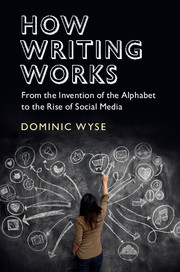Book contents
- How Writing Works
- How Writing Works
- Copyright page
- Dedication
- Contents
- Figures and Tables
- Acknowledgements
- Introduction
- 1 Thinking about Writing and Language
- 2 A History of Writing
- 3 Writing Guidance
- 4 Expert Writers
- 5 Creativity and Writing
- 6 Novice Writers and Education
- 7 The Process of Writing
- Bibliography
- Index
6 - Novice Writers and Education
Published online by Cambridge University Press: 12 December 2017
- How Writing Works
- How Writing Works
- Copyright page
- Dedication
- Contents
- Figures and Tables
- Acknowledgements
- Introduction
- 1 Thinking about Writing and Language
- 2 A History of Writing
- 3 Writing Guidance
- 4 Expert Writers
- 5 Creativity and Writing
- 6 Novice Writers and Education
- 7 The Process of Writing
- Bibliography
- Index
Summary
So far in this book I have examined writing and its processes from five major perspectives: theoretical; historical; trends in writing conventions and guidance; expert writers’ perspectives; and creativity and writing. However, there remains a global arena where a great deal of writing takes place which I have not addressed in depth so far. This is the world of writing as part of education, where learning begins in the home, and continues in schools (and colleges and universities, which were a focus in Chapter 3), and becomes part of the world of work for many people. The term lifelong learning is one favoured by many who study education: writing is a classic example of something that can require lifelong learning, not least because there is always something more about writing that can be learned no matter how expert the writer is.
In the chapter on the history of writing, I explored the movement from oral to literate societies. Although there are still a small number of non-literate societies or communities in the world, the issue of literacy has become a global one that is linked with ideas about disadvantage and poverty. A literate society is certainly not one that is intrinsically superior to a non-literate society. However, there are opportunities that open as a result of being literate, and consequently there are opportunities that are not accessible without literacy. In statistics reported by the United Nations Educational, Scientific and Cultural Organisation (UNESCO) in 2015, it was estimated that worldwide 86% of people age 15 or above were literate, and that 91% of people aged from 15 to 24 years were literate. But this also meant that ‘758 million adults 15 years and older still cannot read or write a simple sentence. Roughly two-thirds of them are female’.
One of the key places that literacy is learned is in formal education, in early years settings and in schools, so first and foremost it is important that children have access to education. The Millennium Development Goals (MDGs) report published in 2015 noted progress in increasing children's attendance at schools but also some severe challenges:
• Half of the 58 million out-of-school children of primary school age live in conflict-affected areas.
- Type
- Chapter
- Information
- How Writing WorksFrom the Invention of the Alphabet to the Rise of Social Media, pp. 178 - 207Publisher: Cambridge University PressPrint publication year: 2017



